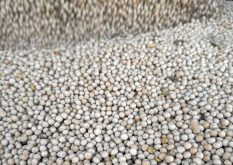Fed cattle demand up
Fed cattle prices rose last week with good demand from Canadian and American buyers, said Canfax.
Average prices were 50 cents to $1 per hundredweight higher than the previous week and volume was up 12 percent.
Prices Jan. 7 in Alberta were steers $87-$89.35 per cwt., flat rail $151.75 and heifers $87-$90.85, flat rail $148-$152.20.
Demand for beef is good and wholesale prices rose from pre-Christmas levels.
Canfax said good results in the first week of the year bode well for the future. Western feedlots are keeping supplies in good shape. Carcass weights are inching lower and are down 25 pounds from the fall peak.
Read Also

Avoid bargain-basement canola markets to ease tariff damage
China’s canola tariffs aside, the global oilseed complex has eased to a lower price level and is likely to stay there for now — that is, unless problems develop with crops in the U.S. or South America.
The strong basis is a result of local supply and demand but also the much improved bargaining position producers have gained so far this winter.
Canfax said prices are expected to remain in the high $80s in the short term with more trade into the $90s closer to February.
Slaughter cows tight
Slaughter cow supply was tight and prices rose last week. Prices for good grain-fed cows rose $2-$3 per cwt. and the outlook is for steady prices.
Many feeder auction rings and producers were still in holiday mode and trade was light last week.
Prices appeared to be mostly steady. Just under 5,000 head were reported sold in Alberta.
Canfax said sales will gradually pick up, and demand is expected to remain strong as feedlots look to fill a few more pens.
In stock cow trade, bred cow prices were $500-$1,125. Bred heifers were $600-$1,075. No cow-calf pairs were quoted. The outlook is steady.
Hog price up
The rising Canadian dollar offset rising United States hog prices last week.
Even so, hog prices on this side of the border reached their highest level in two months.
Higher wholesale pork prices and fewer hog marketings due to bad weather in many hog-producing states encouraged U.S. packers to raise cash prices to $23-$25 (U.S.) per cwt. with highs of $27 (U.S.) per cwt. on Jan 7.
A strong demand for pork and U.S. hog slaughter below peak levels also led to increased hog and pork belly futures prices this week.
In Manitoba average Index 100 hog prices (including premiums) were up to $85.79 per 100 kilograms on Jan. 6, but fell by $5 on Jan. 7.
“While hog prices are expected to rise to profitable levels by early spring, if not sooner, analysts are concerned that once the weather improves in the next week or two, U.S. hog marketings will increase and packers will reduce hog prices,” said Manitoba Agriculture.
Some American hogs might be moving north to be slaughtered. The U.S. National Pork Producers Council said last week that Canadian officials have agreed to consider action to ease the U.S. hog packer bottleneck.
One suggestion was that under- capacity western Canadian hog processors should be allowed to kill American hogs.














